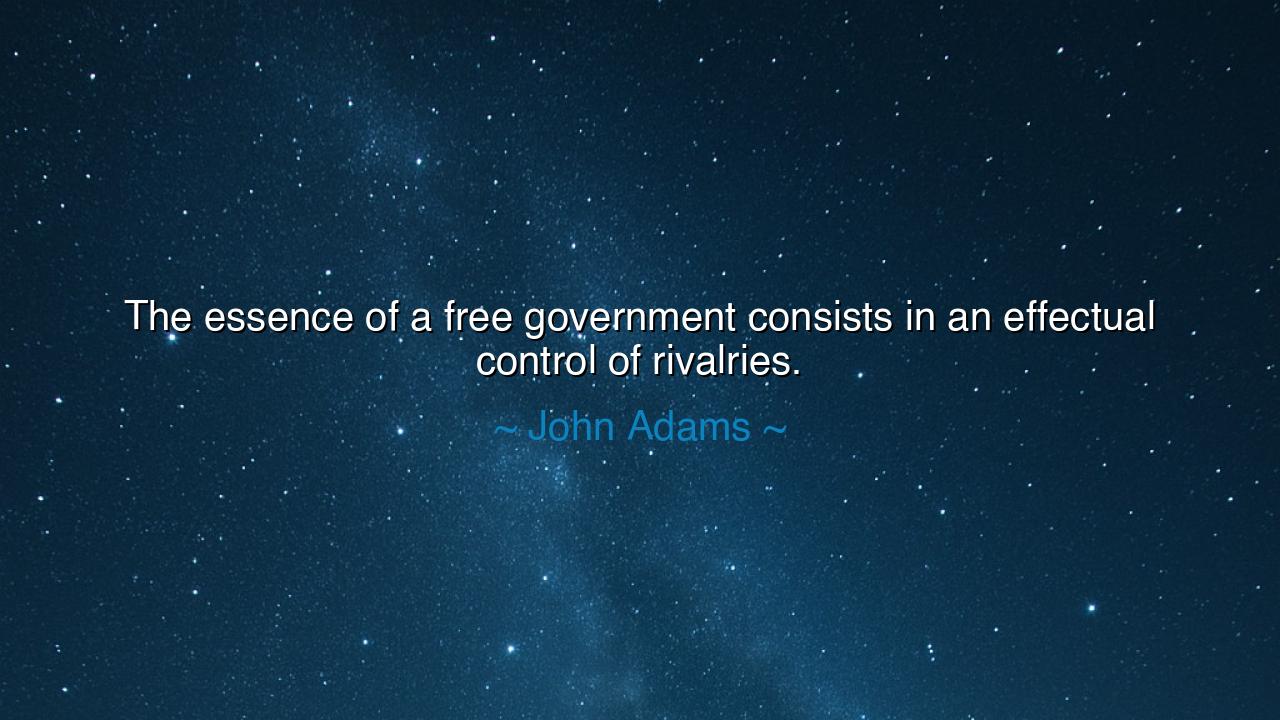
The essence of a free government consists in an effectual control






"The essence of a free government consists in an effectual control of rivalries." — John Adams
In this profound and piercing truth, John Adams, the second President of the United States and one of the chief architects of liberty, speaks to the eternal heart of political order — the balance between freedom and restraint. When he declares that the essence of a free government lies in the control of rivalries, he does not lament conflict; he acknowledges its inevitability. For Adams knew that wherever there are men, there will be ambition, envy, and the desire for power. Freedom does not destroy these passions; it multiplies them. The genius of a free government, therefore, is not in pretending that all men are pure, but in crafting a system where their rivalries are harnessed, balanced, and made to serve the public good rather than destroy it.
Adams spoke from experience, for he had seen the turbulence of revolution and the fragility of unity. In the infancy of the American republic, the Founders debated fiercely — not only against tyranny, but among themselves. Factions arose; parties took shape; pride clashed with principle. Adams, who believed deeply in law and order, feared that without effectual control — without institutions strong enough to channel human ambition — the very freedom they had fought for would crumble into chaos. He had studied the lessons of Athens and Rome, those shining lights of ancient liberty that burned out under the heat of factionalism. Thus, he warned that a republic could not stand on virtue alone; it must be girded by structure, by checks and balances that prevent any man or faction from mastering all others.
In Adams’s mind, the rivalries he spoke of were not merely political, but human — the eternal struggle between self-interest and duty, between passion and reason. He understood that no constitution, however perfect on parchment, could survive unless it tamed the darker impulses of mankind. “There is danger,” he once wrote, “from all men. The only maxim of a free government ought to be to trust no man living with power.” Yet, he was not a pessimist; he was a realist. He believed that liberty could endure only if it built upon human nature rather than denied it. A wise government, therefore, would not seek to eliminate rivalries, but to balance them — like a master builder using tension to uphold an arch.
History offers countless proofs of his wisdom. Consider the tragic fall of the Roman Republic, once the greatest experiment in shared governance. Rome’s constitution was strong, its people proud — yet its leaders failed to control their rivalries. Senators conspired, generals defied the law, and the people, weary of division, placed their hope in a single man: Caesar. Thus liberty perished not by invasion, but by the ambitions of those sworn to defend it. The republic was replaced by empire, and the chain of free government was broken for a thousand years. Adams, steeped in such histories, labored to ensure that America would not repeat that ruin — that her rivalries would be confined within lawful bounds, her passions cooled by the reason of institutions.
Yet Adams’s teaching is not only for governments; it is for all communities and all souls. Within every family, every workplace, every heart, there dwell rivalries — the clash of ego, the hunger for recognition, the conflict between desire and duty. Freedom, whether in a nation or in a person, is not the absence of struggle but the mastery of it. The man who cannot govern himself, Adams would say, cannot help govern a state. Thus, the essence of freedom lies not in license, but in discipline — the power to direct one’s rivalries toward creation rather than destruction.
In this sense, Adams’s words speak to the timeless art of balance. A free society is a living organism, composed of countless wills and voices. Its health depends on harmony, not uniformity; on structure, not suppression. The purpose of government is not to silence differences but to prevent them from tearing the nation apart. A constitution, like the keel of a great ship, must hold steady amid the storms of faction. When laws are fair, when power is divided, when citizens respect both liberty and order, rivalries become the fire that tempers rather than consumes.
So, O listener, take this lesson to heart: freedom is not the gift of chaos, but the fruit of self-control. The rivalries that divide mankind can never be erased, but they can be governed — by justice, by humility, by the discipline of law and the wisdom of virtue. Whether you rule a nation or a household, learn to balance passion with prudence, conviction with compassion. For only in such balance does liberty endure. The government that fails to control rivalries will fall to tyranny; the soul that fails to govern its desires will fall to ruin.
Lesson: The strength of a free society lies not in the absence of conflict, but in its mastery. True liberty is preserved when ambition and rivalry are restrained by law, guided by virtue, and balanced by justice.
Practical Action: In public life, support systems that hold power accountable. In private life, practice self-governance — temper pride with patience, passion with reason. Seek harmony, not dominance, in your dealings. For the art of freedom is the art of balance — and only those who learn it can keep both peace and liberty alive.






AAdministratorAdministrator
Welcome, honored guests. Please leave a comment, we will respond soon